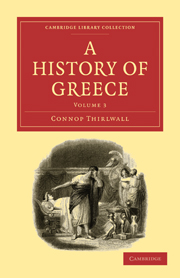Book contents
- Frontmatter
- Contents
- CHAPTER XVII FROM THE COMMENCEMENT OF THE ATHENIAN MARITIME ASCENDANCY TO THE THIRTY YEARS' TRUCE BETWEEN ATHENS AND SPARTA
- CHAP. XVIII FROM THE COMMENCEMENT OF THE THIRTY YEARS' TRUCE TO THE RENEWAL OF HOSTILITIES BETWEEN ATHENS AND CORINTH, WITH A GENERAL VIEW OF THE ADMINISTRATION OF PERICLES
- CHAP. XIX CAUSES AND OCCASIONS OF THE PELOPONNESIAN WAR
- CHAP. XX FROM THE COMMENCEMENT OF THE PELOPONNESIAN WAR TO THE END OF THE THIRD YEAR
- CHAP. XXI FOURTH AND FIFTH YEARS OF THE PELOPONNESIAN WAR
- CHAP. XXII FROM THE BEGINNING OF THE SIXTH YEAR OF THE PELOPONNESIAN WAR TO THE GENERAL PACIFICATION OF SICILY
- CHAP. XXIII FROM THE GENERAL PACIFICATION OF SICILY TO THE PEACE OF NICIAS
- CHAP. XXIV FROM THE PEACE OF NICIAS TO THE CONQUEST OF MELOS
- CHAP. XXV THE SICILIAN EXPEDITION BEFORE THE ARRIVAL OF GYLIPPUS IN SICILY
- CHAP. XXVI THE SICILIAN EXPEDITION FROM THE ARRIVAL OF GYLIPPUS TO ITS CLOSE
- APPENDIX
CHAPTER XVII - FROM THE COMMENCEMENT OF THE ATHENIAN MARITIME ASCENDANCY TO THE THIRTY YEARS' TRUCE BETWEEN ATHENS AND SPARTA
Published online by Cambridge University Press: 05 July 2011
- Frontmatter
- Contents
- CHAPTER XVII FROM THE COMMENCEMENT OF THE ATHENIAN MARITIME ASCENDANCY TO THE THIRTY YEARS' TRUCE BETWEEN ATHENS AND SPARTA
- CHAP. XVIII FROM THE COMMENCEMENT OF THE THIRTY YEARS' TRUCE TO THE RENEWAL OF HOSTILITIES BETWEEN ATHENS AND CORINTH, WITH A GENERAL VIEW OF THE ADMINISTRATION OF PERICLES
- CHAP. XIX CAUSES AND OCCASIONS OF THE PELOPONNESIAN WAR
- CHAP. XX FROM THE COMMENCEMENT OF THE PELOPONNESIAN WAR TO THE END OF THE THIRD YEAR
- CHAP. XXI FOURTH AND FIFTH YEARS OF THE PELOPONNESIAN WAR
- CHAP. XXII FROM THE BEGINNING OF THE SIXTH YEAR OF THE PELOPONNESIAN WAR TO THE GENERAL PACIFICATION OF SICILY
- CHAP. XXIII FROM THE GENERAL PACIFICATION OF SICILY TO THE PEACE OF NICIAS
- CHAP. XXIV FROM THE PEACE OF NICIAS TO THE CONQUEST OF MELOS
- CHAP. XXV THE SICILIAN EXPEDITION BEFORE THE ARRIVAL OF GYLIPPUS IN SICILY
- CHAP. XXVI THE SICILIAN EXPEDITION FROM THE ARRIVAL OF GYLIPPUS TO ITS CLOSE
- APPENDIX
Summary
Though the issue of the Persian invasion had not broken nor even dangerously shaken the power of Persia, it had relieved the European Greeks, and the islanders of the Ægean, from all apprehension of another attack on their freedom from the same quarter. Most of the states now united with Athens would have been satisfied with this security, and had no wish to act on the offensive against the vanquished enemy. But Athens saw a vast field open to her ambition in the East; the situation of the Asiatic Greeks afforded a fair pretext for the continuance of hostilities, and many of her leading statesmen were desirous of giving this direction to the restless spirit of their countrymen.
Foremost among these was Cimon, son of Miltiades. In his youth he gave little promise of the abilities or of the character which he afterwards displayed, and seemed to have inherited the limited capacity of his grandfather, who had incurred a nickname expressive of extreme simplicity, rather than his father's genius. His propensity to pleasure was thought to be so strong as to divert his attention from business, and drew on him the satire of the comic poets; and in his early youth he is said to have neglected the ordinary accomplishments of an Athenian gentleman. If however this was the case, he would seem, from an anecdote reported by Plutarch on the authority of a contemporary, to have supplied this deficiency at a later period.
- Type
- Chapter
- Information
- A History of Greece , pp. 1 - 45Publisher: Cambridge University PressPrint publication year: 2010First published in: 1836



